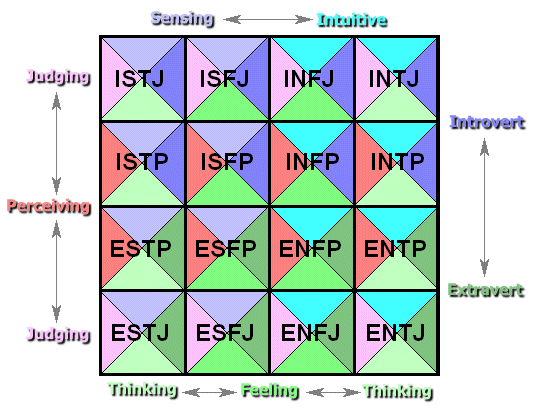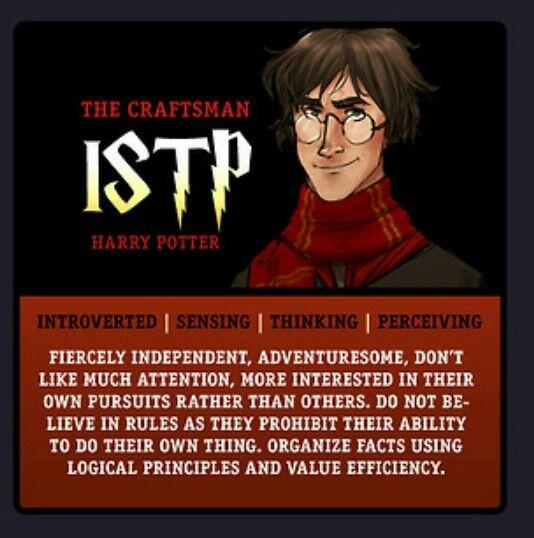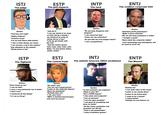
| Navigation |
| About • Origin • Spread • Notable Examples • Search Interest • External References • Recent Images • Recent Videos |
About
The Myers-Briggs Type Indicator (MBTI) is a questionnaire designed to assess one's psychological preferences and in accordance to a group of 16 distinct classifications of personalities an individual may exhibit. On the web, the MBTI is often used as a template for personality questionnaires in the realm of fandoms, in a similar vein to "which character are you?" tests.
Origin
The Myers–Briggs Type Indicator (MBTI) assessment is a psychometric questionnaire designed to measure psychological preferences in how people perceive the world and make decisions. The framework was developed by American psychologists Katherine Cook Briggs and Isabel Briggs Myers, based on theories proposed by renowned psychologist Carl Jung, during the World War II in the 1940s[1], with the belief a knowledge of personality preferences would help women who were entering the industrial workforce, and it was published in 1962.

The earliest known resource website for the MBTI was created in 1998 under the domain personalitypage.com,[7] which remains active as of January 2015. One of the first notable online commentaries on the Myers-Briggs Type Indicator can be found in a blog post by Canadian journalist and author Malcolm Gladwell on September, 2004, in which he criticized the M.B.T.I. for having "a large problem with consistency" and that its founders "did not actually understand Jung at all"[2].
Spread
On June 14th, 2006, a blogger named Peter shared a career-oriented version of the MBTI chart in a post titled 'Myers-Briggs typology: I’m an ENFP' on his personal website.[3] In the post, the blogger described the MBTI as more or less a more credible form of astrology and presented an image of the MBTI chart that showed female actresses that befit their assumpted personality type.

On April 6th, 2013, the blog A Little Bit of Personality was created. The blog is currently active and is dedicated to the Myers-Briggs Personality Type Indicator, often posting summaries and explanations to how fictional characters are apt to belong to one personality type or another[4].

On Tumblr[6], the tag #mbti chart yields a wide variety of custom MBTI charts repurposed as fandom questionnaires.
Criticism
Albeit popular, the Myers-Briggs Type Indicator has been proven by professional statisticians and psychologists to be highly unreliable. The negative criticism against the MBTI has been sustained by evidence for over three decades[5]. Some researchers have interpreted the reliability of the test to be low. Studies have found that between 39% and 76% of those tested fall into different types upon retesting some weeks or years later[1]. A second criticism is that the MBTI mistakenly assumes that personality falls into mutually exclusive categories. You are either an extrovert or an introvert, but never a mix of the two. Yet most people fall somewhere in the middle. According to psychologist David Pittenger, caution is advised when using the MBTI for professional purposes. Furthermore, Pittenger believe that its success is due to “the beguiling nature of the horoscope-like summaries of personality and steady marketing.”[5]
Notable Examples






Search Interest
External References
[1] Wikipedia – Myers-Briggs Type Indicator
[2] Gladwell – Personality Plus
[3] Forret – Myers-Briggs typology: I’m an ENFP
[4] A Little Bit of Personality – ALBoP
[5] Fortune – Have we all been duped by the Myers-Briggs test?
[6] Tumblr – mbti chart
[7] PersonalityPage.com – The Personality Page

![As an INTJ V(X^YIZ) = AX 4xt/[y(r-K)] = B 3^(r-1/z) - Vrz = z WX - Y)/(2x- k) = R E(1/z)^[sin(y)] = ((x))) 2+2 =.. 2 Why am I laughing? Apologies, my friend. It's just that as an INTJ, these illogical actions of yours...well, I find them to be amusing. What's that? A free sample of your store's new crispened potato snacks? Not necessary. I've already calculated its flavor in my head. Mmm...perhaps a little more Sodium Chloride next time...](https://i.kym-cdn.com/photos/images/list/001/877/318/5d8)


![MBTI Gnosticism In Olympus sits the puppet master, INTJ. His strings wind down the slopes toward Norminium below. Those in the bacchanal are oblivious to the tension above. The INTJ's patrician grip on Ulympus is weakening. Though indeed, INTJ is truly the master of man, he is a man and, bows to another master. Mad fits have lead others in Olympus to question him. Let us leave the astral plane and have a gander:*] "But, INTJ, my dear fellow, can you not see that you yourself are also a pawn? Those who are evil are being transmuted, for they have no place in a peaceful Divine creation. You die as king and are reborn as pawn, we are all pawns and knights alike. The archon who is weak has three names. The first name is Yaltabaoth, the second is Saklas, and the third is Samael. And he is impious in his arrogance which is in him. For he said, 'I am God anid there is no other God beside me,' for he is ignorant of his strength, the place from which he had come. This universe is only one of a large number of universes and it is only one of a few which have been affected by the evil essence." INTP INFJ "I'll stomp out this roach. INTJ" "NO, bullies OUT. l'm sick of xNTJ and their bully zone." These chains are my 0wn design T am the master of the game" ENTJ INTJ ENFP I HATE you, INTJ" INFP "KILL THEM ALL, ENTJ. KILL THEM ALL GET OUT GET OUT I'M IN CHARGE HERE" The game is all too cruel" INFP Do yo l in charge?" "Cry me a river, the "game" doesn't even exist. Just try and debate me." ENTP "Cool your autism, INTJ" INTJ "It's... Him!" "ahahaha roaches, the lot of you. None can escape my game, the only escape iS death, my sweet pawns ENFJ INTJ INTP Meanwhile, in Norminium: "I wish ESTP would hit on "me, why does the world hate me so? oh woe, oh woe" "ayo bby, u want some fucc?" ISFP "Hey, erm sorry dood. It looks like ESTP is hitting on your gf ''tee hee, ESTP, you're soo bad! can change you" what the f--- is ISTP even doing here? He's such3 a weirdo ESFJ ESTP ISTJ 'what the f--- are you looking at, ESFJ you c--- l'll knock you out. l'm not drinkinig because I have work tomorrow morning, my boss is really getting on my case about those reports' "Hey, ISTP. What's up man?" What's up PHa s up ITm an What the f--- is ISTP even doing here? ISTP](https://i.kym-cdn.com/photos/images/list/001/439/896/39b.png)












Comments ( 135 )
Sorry, but you must activate your account to post a comment.
Please check your email for your activation code.